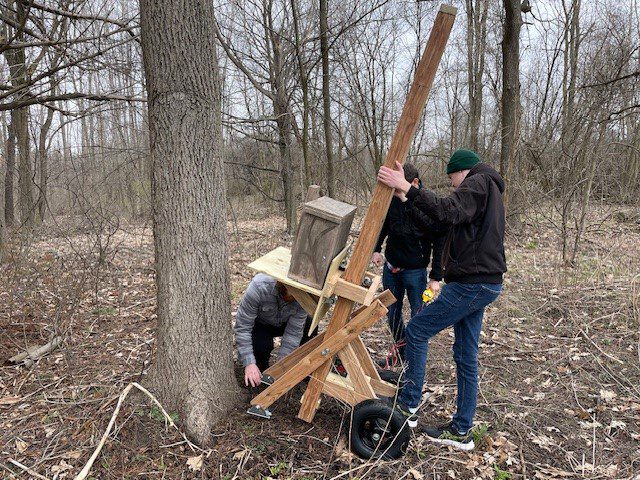On April 19, 2024, members of the Mechanical Engineering Design capstone course at Michigan State University presented their design for a portable swarm trap lifter. The equipment was created for AgrAbility client and Heroes to Hives program instructor, Gary Brown, who has a back injury that limits his ability to climb a ladder or move heavy equipment.
“We chose this project because we knew that it would have a community impact,” Bennett Guensche of Grand Rapids said. “Our team wanted to do something that would benefit the user well beyond the end of the semester.” The team was comprised of Guensche, along with Bradley Haskin, Amanda Jeffers, Brandon Roux, and Daniel Staal. None of the students had any prior experience with beekeeping or AgrAbility.

Working directly with AgrAbility staff, MSU Extension staff, and the client, the student team learned about swarms and the unique context for swarm traps. From there, they designed the swarm trap lifter, which is portable and operates with the help of a battery-powered winch system that raises the trap from three to seven feet. From there, the user can slide the swarm trap off the shelf and onto a nail already in place on the tree or take down the swarm trap to relocate a honey bee swarm into a hive. The students also created a document with detailed step-by-step instructions on how to build the swarm trap lifter and where to procure supplies, simplifying the process for anyone who may be interested in recreating their design for their own operation.
The team also ensured that the design was financially accessible; Guensche commented that building the device out of wood was challenging for their team but because the average beekeeper would not have access to the machining equipment in their class, they had to work within that parameter to keep the design simple and inexpensive. Materials for the portable swarm trap lifter cost between $300 and $400, depending on whether the beekeeper decides to utilize an electric winch or a hand crank system to raise and lower the platform. Overall, the design costs about 10x less than typical electric lifters found online. Soon after the event, the design team delivered the finished product to the AgrAbility client.
“He was very pleased to see that all it required was the press of a button to lift and lower the box,” Guensche said. “We fulfilled all his wants and needs with the device. We showed it to him at his local VFW post where he has a few bee hives in the back. This is also where he does his bee classes and teaches others how to bee keep. He brought out his box with him so we could test it with the real thing. That was the first time we ever tested it on dirt, and we were pleased to see that it still functioned as intended and the lifter was stable.”
“It was a great project for them, and I feel that they had some great head scratches during the development of the Swarm Trap Lifter,” Brown said.
AgrAbility has sponsored 22 mechanical engineering capstone projects since 2015. Past projects include an automatic gate opener, a folding tractor step, an outdoor wood furnace loader, and other beekeeping equipment that alleviate lifting constraints. These assistive technologies have helped improve quality of life for numerous AgrAbility clients. In 2023, the program assisted 215 clients across the state. The mission of AgrAbility is to improve the quality of life for farmers with a disability, injury, or illness through direct technical assistance and implementation of assistive technology on the farm to simplify tasks and keep people farming.
AgrAbility is a U.S. Department of Agriculture-funded program that assists farmers with a disability, illness, or injury, and in Michigan it’s operated as a partnership between Michigan State University and EastersealsMORC. Design Day is the culmination of a semester-long capstone course for all engineering students and provides an opportunity for students to “use the technical expertise, communication skills, and teaming methodologies… to solve real world problems,” according to the 2024 Design Day booklet. (See page 142 for the AgrAbility project.)
This project was supported by the AgrAbility Competitive Program of the USDA National Institute of Food and Agriculture (NIFA), grant number 2014-41590-22327. It was also supported by the Enhancing Agricultural Opportunities for Military Veterans grant, award no. 2021-77028-35274 from the USDA National Institute of Food and Agriculture.
Any opinions, findings, conclusions or recommendations expressed in this publication are those of the authors and do not necessarily reflect the view of the U.S. Department of Agriculture.
This story was originally published on MSU Extension.
About the MSU Innovation Center:
The MSU Innovation Center is dedicated to fostering innovation, research commercialization, and entrepreneurial activities from the research and discovery happening across our campus every day. We act as the primary interface for researchers aiming to see their research applied to solving real-world problems and making the world a better place to live. We aim to empower faculty, researchers, and students within our community of scholars by providing them with the knowledge, skills, and opportunities to bring their discoveries to the forefront. Through strategic collaborations with the private sector, we aim to amplify the impact of faculty research and drive economic growth while positively impacting society. We foster mutually beneficial, long-term relationships with the private sector through corporate-sponsored research collaborations, technology licensing discussions, and support for faculty entrepreneurs to support the establishment of startup companies.
Is your company interested in working with MSU’s agriculture innovators? Click Here.

